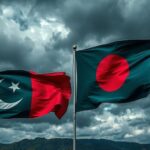Bangladesh’s Path to Securing WTO Trade Benefits Ahead of LDC Graduation
Bangladesh is striving to maintain duty-free export facilities for three years post-LDC graduation and seeks to extend TRIPS benefits until 2033. Current challenges include low international interest in securing these trade benefits, potential increases in pharmaceutical prices, and the end of export subsidies post-graduation. Strategic reforms and negotiations are crucial for ensuring economic stability and continued export growth.
Bangladesh is currently focused on retaining duty-free export facilities for a minimum of three years following its graduation from Least Developed Country (LDC) status, particularly in light of anticipated challenges. The nation is also aiming to extend the benefits granted under the Trade-Related Aspects of Intellectual Property Rights (TRIPS) agreement until 2033, as officials contend that failure to secure these benefits could lead to increases in pharmaceutical prices by nearly 20%.
Prior to its expected LDC graduation in November 2026, Bangladesh continues to encounter difficulties in securing these vital World Trade Organization (WTO) trade benefits. Efforts made since 2018 to ensure duty-free exports and sustain government subsidies for agricultural and non-agricultural products have been hampered by a lack of interest from member states, as articulated by both current and former officials in the commerce ministry.
Concerning TRIPS discussions, officials lament that dialogues regarding Bangladesh’s request to enhance TRIPS benefits at the WTO are presently “frozen.” This stagnation could jeopardize the pharmaceutical sector’s significant gains derived from the current provisions, which may culminate in substantial price hikes for essential medicines.
The political environment surrounding the WTO has become complex, particularly following the Trump administration’s impacts, which have led to diminished prospects for securing supportive trade benefits. The economic landscape facing Bangladesh due to its forthcoming graduation includes inherent risks that necessitate a focus on macroeconomic stability before this transition.
To mitigate these risks, there is a strong emphasis on ensuring stable foreign exchange reserves, maintaining steady interest rates for private sector loans, and diversifying export commodities. Experts advocate for strategic incentives aimed at enhancing export capabilities within specific sectors. Bangladesh’s application to the WTO for an extended Generalized System of Preferences (GSP) has not garnered the required support, leading to proposals urging countries to follow the EU’s example of granting similar benefits for three years post-graduation.
Furthermore, maintaining existing agricultural export subsidies is contingent upon achieving net food-importing country status, a designation Bangladesh is striving to secure. Previous attempts to attain this status have not materialized, and the nation must reapply by March of the following year, showcasing significant reliance on food imports.
Export prospects appear relatively secure in markets such as the European Union (EU) and the United Kingdom (UK) until at least 2029. However, concerns loom regarding the United States’ imposition of tariffs, which is expected to adversely affect Bangladeshi exports unless alleviated. Bangladesh must meet labor rights conventions to continue benefiting from EU GSP Plus provisions beyond 2029.
Compliance with copyright laws post-graduation poses further challenges, as many local industries rely heavily on pirated software and foreign publications, potentially leading to cost increases in essential sectors like healthcare.
Amid these complex challenges, a high-level meeting led by Chief Adviser Muhammad Yunus is set to explore strategies for addressing the transitions associated with LDC graduation. The discussions may result in pivotal measures outlined in the upcoming budget to navigate trade environments effectively while endorsing continued support through initiatives such as discounted utilities and fostering Free Trade Agreements. Bangladesh’s official graduation from the UN LDC list is scheduled for November 24, 2026, following a five-year transition phase.
Bangladesh’s impending graduation from LDC status presents significant challenges regarding trade benefits and economic stability. The country must prioritize securing extended trade concessions, particularly in the face of pressures from international markets and evolving trade regulations. Ensuring macroeconomic stability, compliance with necessary international agreements, and navigating the complexities of transitioning to a more competitive export environment are crucial for maintaining the country’s economic growth and resilience post-graduation.
Original Source: www.tbsnews.net






Post Comment